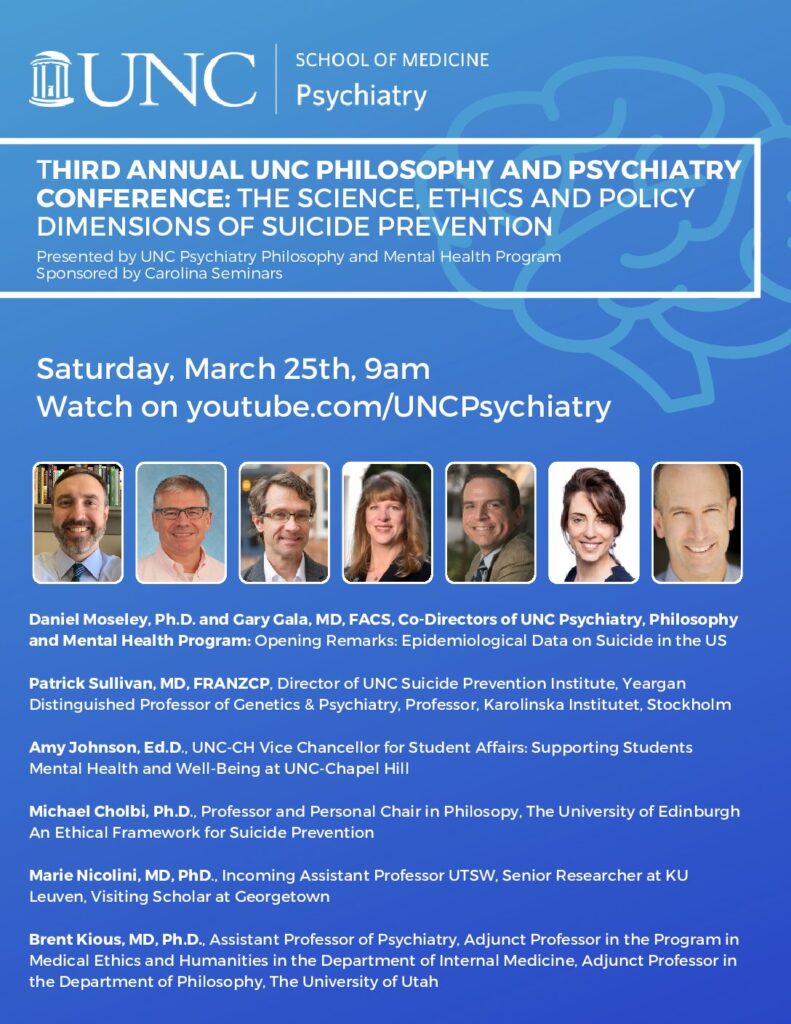
9:00-9:15 Gary Gala, MD, FACS, Co-Director of UNC Psychiatry, Philosophy and Mental Health Program
Opening Remarks
9:15-9:30 Patrick Sullivan, MD, FRANZCP, Director of UNC Suicide Prevention Institute, Yeargan Distinguished Professor of Genetics & Psychiatry, Professor, Karolinska Institutet, Stockholm
The UNC Suicide Institute and Core Epidemiological Data on Suicide in the U.S.
9:30-10:15 Amy Johnson, Ed.D., UNC-CH Vice Chancellor for Student Affairs
Supporting Students Mental Health and Well-Being at UNC-Chapel Hill
Vice Chancellor for Student Affairs Amy Johnson will share the key initiatives and resources implemented over the last two years to address and support student mental health and wellbeing. The discussion will review several takeaways from Carolina’s efforts, as well as preliminary observations from recent student research conducted in fall 2022.
10:30-11:30 Michael Cholbi, Ph.D., Professor and Personal Chair in Philosopy, The University of Edinburgh
An Ethical Framework for Suicide Prevention
Although philosophers and medical ethicists have addressed ethical questions concerning suicide prevention, their efforts have tended to be piecemeal rather than systematic. Here I advance a framework for ethical deliberation concerning suicide prevention choices and policies resting on six factors. This framework has plausible implications concerning the ethical justifiability of different choices and strategies, as well as illuminating what makes ‘hard cases’ particularly challenging.
11:35-12:35 Marie Nicolini, MD, PhD., Incoming Assistant Professor UTSW, Senior Researcher at KU Leuven, Visiting Scholar at Georgetown
Suicide Prevention and Physician-Assisted Death
Physician-assisted death for people who are not terminally ill, as allowed in some countries, creates tension with suicide prevention policies. A pressing public health issue, the tension raises deep philosophical questions. In this talk, I identify and address the underlying incoherence: how the patient’s rationality relates to the morality of suicide.
12:40-1:40 Brent Kious, MD, Ph.D., Assistant Professor of Psychiatry, Adjunct Professor in the Program in Medical Ethics and Humanities in the Department of Internal Medicine, Adjunct Professor in the Department of Philosophy, The University of Utah.
The Minority Report: Is Big-Data Suicide Risk Prediction Something We Should Want?
Historically, suicide death has been hard to predict. Fortunately, modern big-data technologies have the potential to greatly improve suicide prediction, by drawing upon multiple sources of data relevant to suicide risk: health-care records, genetic data, multimodal recordings from smart devices, and social media posts, among others. I will argue, however, that we should embrace big-data suicide prediction only with great caution: even perfect risk prediction could still have greater harms than benefits, and in the near future, risk prediction is likely to be far from perfect.
1:40-2:00 Closing Remarks
